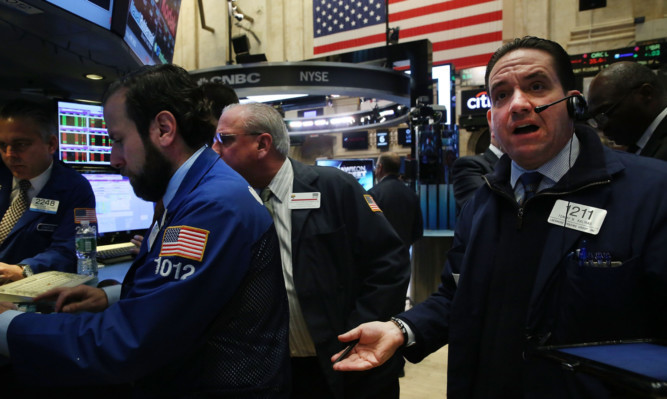Alex Bell is a former head of policy to Alex Salmond in the Scottish Government and a journalist of 30 years’ standing. Here he begins a new weekly column for The Courier.
The Royal Bank of Scotland is predicting a crash this year. It is advising investors to pull out of anything risky and settle for cash or the safest of bonds. They are not alone. Fear creeps across the City of London.
It is unlikely you will have been given the same warning as RBS’s clients. When withdrawing £20 the cash machine won’t have flashed up “chances of global recession high, reduce your debt pronto”.
They give storms names now, to warn us of impending risk. Perhaps they should do the same with economic crisis “economic collapse Charlie is coming in, don’t over extend yourself”.
However, the system actively depends on our ignorance you and I going out to spend is the last desperate line in the war against recession.
Andrew Roberts, RBS’s credit chief, advised clients this week: “China has set off a major correction and it is going to snowball.
“Equities and credit have become very dangerous and we have hardly even begun to retrace the ‘Goldilocks love-in’ of the last two years.”
Not so wealthy
To decode that, a “major correction” means the Chinese have finally accepted their amazing growth is not quite as amazing as everyone hoped. China isn’t as wealthy as it thought which means the world is a bit poorer too. The “Goldilocks love-in” refers to the nursery fable’s key line, where the girl finds everything “just right” so investors have been looking around and seeing low interest rates, a mild improvement in the UK economy, Chinese growth and have called these conditions “just right”.
The love-in is over China is contracting, oil prices are crashing, American growth is impeded by a strengthening dollar and whatever was making the UK Chancellor confident in the autumn has now turned sour in his stomach.
The RBS is not alone in predicting gloom. Albert Edwards of Societe Generale bank warns: “The financial crisis will reawaken. It will be every bit as bad as in 2008-09 and it will turn very ugly indeed.”
You might have thought this couldn’t happen so soon after the last crash. There was talk then of reforms.
Unfortunately, that presumes people know what they are doing. However, the old maxim “nobody knows anything” applies in spades to global finance.
There are many people who are expert in parts of the system but predicting how the whole thing behaves is still a matter of guesswork.
“They (central bankers) didn’t understand the system then and they don’t understand how they are screwing up again. Deflation is upon us and the central banks can’t see it” says Edwards of how it is possible to repeat the mistakes of 2008.
So why don’t these well-paid advisers spread the news? Your next credit card bill will not come with a flyer suggesting you pay off the debt fast in case you lose your job in the next recession.
The reason is simple. It’s not only central bankers who can be accused of ignorance. Politicians are guilty too.
They have witnessed the great expansion in wealth since 1980 and marvelled. When wealth is growing, voters are happy.
It’s not purely cynical though with an expanding economy, investments can be made in stuff. In short, the money is available for governments to do things.
Finance ministers enjoy the growth but can’t fully explain it. Economics is never a science but it has become quasi-religious, boiling down to faith and prayer.
Attracting money gods
In the UK the ritual of how to attract the money gods has been pretty similar for the last 35 years. Boost house prices, encourage people to spend on credit and hopefully, the economy will grow.
It worked for Margaret Thatcher, Tony Blair and briefly for David Cameron. The trick is wearing thin and producing less effective results. It is also a sure way to provoke a bust after the boom.
But what politicians can’t and won’t do is suggest you only spend within your means. Prudent citizens ruin the trick. It is vital ordinary households go out and spend on credit if the economy is to stutter on.
That’s why the rich get warnings and the rest of us get burnt.
As the evidence mounts that relying on house prices and domestic credit isn’t such a great policy after all, perhaps this crash will be the one to make us rethink the whole system.
The problem is not you and I spending credit as explained, that’s essential but in central bankers not understanding what’s going on and governments picking up the bill when it all goes wrong.
The problem also lies with the very clients the RBS is warning. When the rich can get a heads-up and withdraw money from the economy, they make a bad situation worse.
When that money is never invested in domestic growth, they ensure we never reform our economic base. In the meantime, don’t forget that just because you paid for Christmas on plastic, it isn’t your fault.
